Taliban seizes cities as Afghan military collapses
More than 1,000 soldiers flee across border as others hand over weapons to insurgents
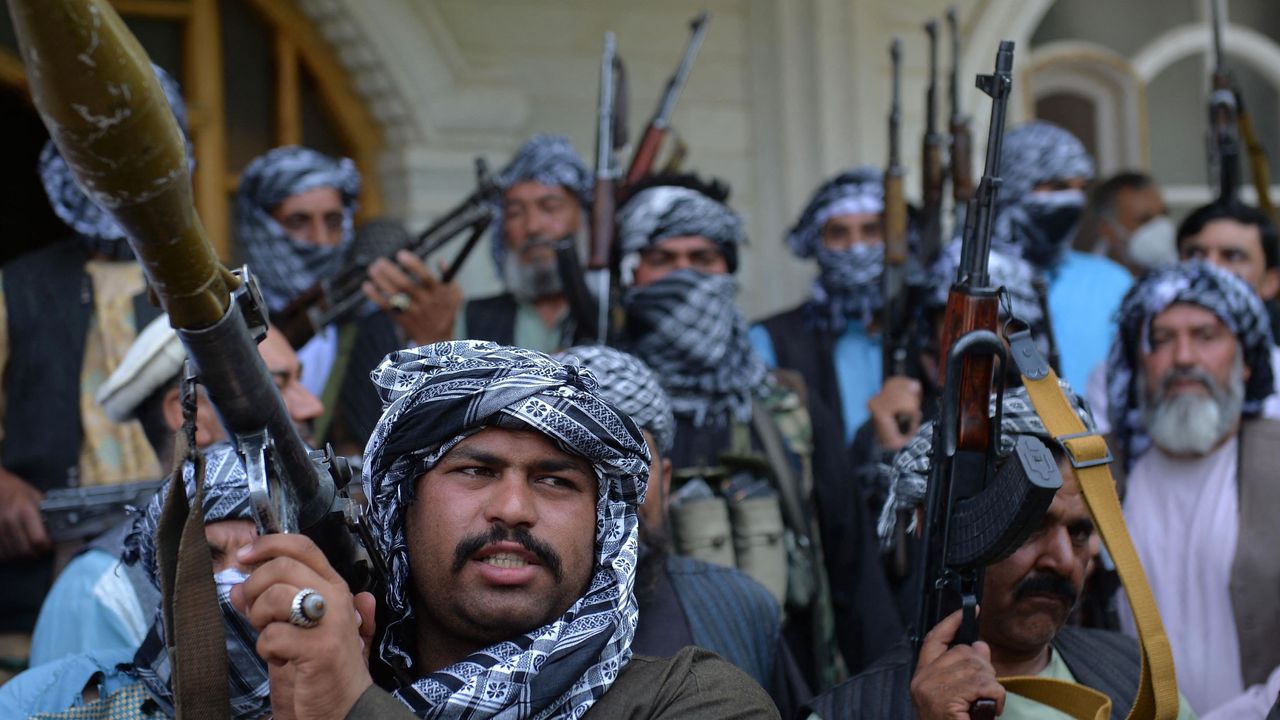
When the US began dropping bombs on Afghanistan in October 2001, a conflict was triggered that would stretch beyond two decades and claim the lives of 2,300 US troops and more than 43,000 civilians.
As the US and Northern Alliance Forces took the capital Kabul, the Taliban - which had ruled Afghanistan since 1996 - called for a negotiated settlement to end the conflict. Then US president George W. Bush responded: “There’s nothing to negotiate.”
But with American troops still in the war-torn country today, the tone of both the Islamists and Washington has shifted significantly.
Subscribe to The Week
Escape your echo chamber. Get the facts behind the news, plus analysis from multiple perspectives.

Sign up for The Week's Free Newsletters
From our morning news briefing to a weekly Good News Newsletter, get the best of The Week delivered directly to your inbox.
From our morning news briefing to a weekly Good News Newsletter, get the best of The Week delivered directly to your inbox.
‘Elephant in the room’
Joe Biden’s administration has offered the Taliban an interim power-sharing agreement with the Afghan government, as the US faces an impending deadline set by Donald Trump for the withdrawal of the remaining American troops in the South Asian nation.
The latest bid to end America’s “forever war” has been met with “swagger” from the Taliban, says The New York Times (NYT), which reports that the insurgent group’s leaders are “promoting a bold message: we have already won the war”.
Peace talks aimed at securing a peaceful post-occupation future are set to begin in Turkey next month, but the “elephant in the room” will be the “half-acknowledged truth that the Taliban have the upper hand and are thus showing little outward interest in compromise”, the newspaper adds.
Sign up for Today's Best Articles in your inbox
A free daily email with the biggest news stories of the day – and the best features from TheWeek.com
The insurgents clearly “have the advantage”, agrees The Hill, having “slowly overrun Afghan military bases, steadily taken control of large swaths of countryside and encroached on cities”.
The Taliban’s deputy leader Sirajuddin Haqqani declaring in a recent speech that “no mujahid ever thought that one day we would face such an improved state, or that we will crush the arrogance of the rebellious emperors, and force them to admit their defeat at our hands”.
To put that another way, says the NYT, “having outlasted the all-powerful Americans, the rest is child’s play, in the Taliban’s view. The game is essentially over.”
“While the Taliban’s current rhetoric is also propaganda, the grim sense of Taliban supremacy is dictating the response of a desperate Afghan government,” the paper continues.
The insurgents’ victory claim “contributes to the abandonment of dozens of checkpoints and falling morale among the Afghan security forces”, who according to a Western diplomatic source in Kabul, “are already hammered by a ‘not sustainable’ casualty rate of perhaps 3,000 a month”.
Retired Afghan army general Mirza Aslam Beg predicts that the decisive moment in the decades-long war will come when the last US troops leave his country, a withdrawal currently scheduled for completion by 1 May.
Taliban resistance “will grow in intensity”, with the Islamists “gradually consolidating their writ” in the 80% of Afghan territory in which they already have partial control, and “laying siege to towns and cities” currently held by President Ashraf Ghani’s government, Beg writes in an article for Pakistani newspaper The Nation.
Yet despite that prospect, the US faces “the dilemma of the devil and deep sea” in deciding whether to go ahead with the scheduled withdrawal, Beg argues. Afghanistan “remains weak and poorly governed”, but the US will suffer “a bigger loss of face” if it decides to stay on “in a war it cannot win”.
As the Biden administration wrestles with this dilemma, the Taliban are already “planning to restore their Islamic emirate”, according to Jawed Kohistani, an Afghan analyst and former security official in Kabul.
“They think they have beaten the Americans, so they can beat the other Afghan forces as well, and get control over the country,” Kohistani told the NYT.
Least worst option?
The power-sharing deal is at the heart of Biden’s plan to get US troops out of Afghanistan and reduce America’s footprint in the Middle East. But “the very notion strains credulity”, says the Brookings Institute’s Michael E. O’Hanlon and Omar Sharifi.
“Apparently, people are to believe that the group that took Afghanistan back to the stone ages in the 1990s, that then harboured and protected the perpetrators of 9/11, and that remains deeply in bed with al-Qaeda, will voluntarily form a new interim government with some elements of President Ashraf Ghani’s administration,” the pair write.
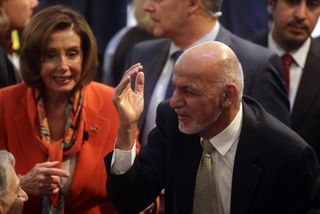
However, while the plan may be built on flawed logic, it “sounds better than another ten or twenty years of forever war, in which government forces slowly but inexorably lose ground to extremists, while foreign forces try to stanch the bleeding”, they concede.
Maintaining a military presence in the country “will invite the insurgent group to restart killing American personnel”, adds Vox, which notes that “there’s simply no overarching consensus on which is the best course of action”.
The fear among Biden’s advisors is that his “administration will own the consequences of what looks to be an increasing calamity in Afghanistan”, says retired US Army Colonel Chris Kolenda, who commanded troops in Afghanistan and served as an advisor to Afghan civilian security forces.
Yet simply maintaining “the status quo locks in misery that the 38 million or so Afghans are living in”, Kolenda told the news site. “That status quo is just not sustainable.”
All the same, the possibility of an Afghanistan run by the Taliban is “causing concern and fear in the minds of the secular world”, Beg writes in The Nation.
That prospect is regarded as an imminent reality by the insurgent group, who believe “their advances will inexorably lead to the end of the Kabul government”, says the NYT.
“On the battlefield there is a sense that, ‘We’re stronger than ever,’” Ashley Jackson, a Taliban expert at the London-based Overseas Development Institute, told the paper.
“Power-sharing and democracy, these are anathema to their political culture.”
Joe Evans is the world news editor at TheWeek.co.uk. He joined the team in 2019 and held roles including deputy news editor and acting news editor before moving into his current position in early 2021. He is a regular panellist on The Week Unwrapped podcast, discussing politics and foreign affairs.
Before joining The Week, he worked as a freelance journalist covering the UK and Ireland for German newspapers and magazines. A series of features on Brexit and the Irish border got him nominated for the Hostwriter Prize in 2019. Prior to settling down in London, he lived and worked in Cambodia, where he ran communications for a non-governmental organisation and worked as a journalist covering Southeast Asia. He has a master’s degree in journalism from City, University of London, and before that studied English Literature at the University of Manchester.
-
 Amazon's 'James Bond' deal could mean a new future for 007
Amazon's 'James Bond' deal could mean a new future for 007In the Spotlight The franchise was previously owned by the Broccoli family
By Justin Klawans, The Week US Published
-
 Why are Republicans suddenly panicking about DOGE?
Why are Republicans suddenly panicking about DOGE?TODAY'S BIG QUESTION As Trump and Musk take a chainsaw to the federal government, a growing number of Republicans worry that the massive cuts are hitting a little too close to home
By Rafi Schwartz, The Week US Published
-
 What is JD Vance's Net Worth?
What is JD Vance's Net Worth?In Depth The vice president is rich. But not nearly as wealthy as his boss and many of his boss' appointees
By David Faris Published
-
 Will Iran's attack on Israel backfire?
Will Iran's attack on Israel backfire?Today's Big Question The unprecedented targeting of Israel could be a 'godsend' for Netanyahu as the limits of Tehran's military power are exposed
By Elliott Goat, The Week UK Published
-
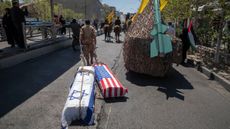 Will Iran risk all-out war with Israel?
Will Iran risk all-out war with Israel?Today's Big Question Tehran has not wanted to be directly involved in the Middle East conflict so far. But that could be about to change
By Chas Newkey-Burden, The Week UK Published
-
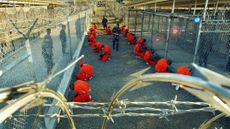 A history of Guantánamo Bay
A history of Guantánamo BayThe Explainer War of Terror's 'symbol of torture, rendition and indefinite detention' is subject of new Serial podcast series
By The Week UK Published
-
 'Humanitarian islands': how will Israel's plan for Rafah civilians work?
'Humanitarian islands': how will Israel's plan for Rafah civilians work?Today's Big Question Designated zones in central Gaza to provide temporary housing, food and water for more than a million displaced Palestinians
By The Week UK Published
-
 How likely is an accidental nuclear incident?
How likely is an accidental nuclear incident?The Explainer Artificial intelligence, secret enemy tests or false alarms could trigger inadvertent launch or detonation
By Chas Newkey-Burden, The Week UK Published
-
 Pentagon struggles to explain Defense Secretary Lloyd Austin's secret hospitalization
Pentagon struggles to explain Defense Secretary Lloyd Austin's secret hospitalizationSpeed Read The intensely private Pentagon chief kept even President Joe Biden in the dark about his illness for 3 days
By Peter Weber, The Week US Published
-
 Israel-Hamas: what do both sides need in order to agree a sustainable ceasefire?
Israel-Hamas: what do both sides need in order to agree a sustainable ceasefire?Today's Big Question Israel and Hamas 'open' to renewed ceasefire and hostage release, as pressure mounts on Benjamin Netanyahu at home and abroad
By Elliott Goat, The Week UK Published
-
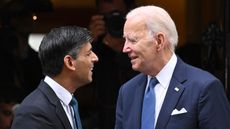 Cluster bomb controversy hangs over Biden’s ‘chilly’ visit to UK
Cluster bomb controversy hangs over Biden’s ‘chilly’ visit to UKTalking Point US cites military ‘expediency’ but allies warn bombs could lose Ukraine the ‘moral high ground’
By The Week Staff Published